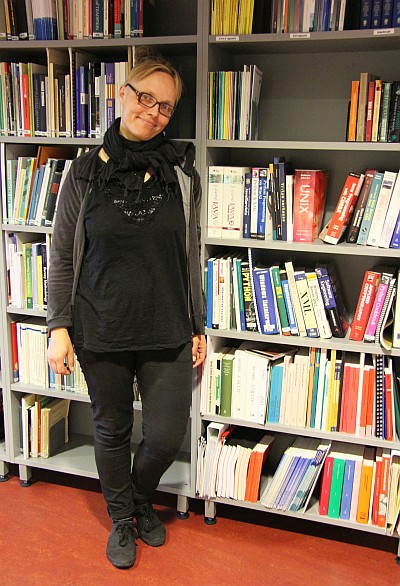Text and photo: Kaisa Järvelä
Thesis on Functionality of Search Queries in Aila
In her thesis, Anna Tuominen focused on the information seeking behaviour of Aila Data Service users. The service allows online data downloading and is provided by the Finnish Social Science Data Archive. She found that the majority of users opt for free text queries to find research data even though this search strategy may result in very long lists of results. Keyword searching would provide more relevant results, but users seemed to find it difficult.
Anna Tuominen studies Information Studies and Interactive Media at the University of Tampere. Her thesis was based on information provided by Aila log files and gave useful tips on how to develop the search interface.

Anna Tuominen found that log data are useful for providing information on the functionality of a digital service.
"The log data gave concrete information on how users search for data, what kind of keyword queries they use and how, and what kind of results they get," Tuominen says.
Her study showed that no less than 89% of users chose to enter their queries into one of the free text search fields, and 59% used only the general free text search field.
Only 16% had ventured to try keyword searching, and of them, only 60% used a term that was included in the thesauri the FSD uses for indexing.
"The results are similar to other research on information seeking behaviour, mostly consisting of studies focusing on search strategies of scientific library users," she says.
The findings from other studies also confirm that users favour simple search strategies and find it challenging to choose good terms for keyword queries.
Another common finding with previous studies was that users who are familiar with the subject beforehand often opt for title searching which, when successful, yields relevant hits.
Effective search strategies crucial for digital services
Anna Tuominen wished to study something connected to metadata and successful search strategies. She contacted several organisations, including the FSD, to find a suitable subject.
"I found out that the Aila service was just about to be launched, very conveniently from the viewpoint of my research. Users had a few months to use the service before I needed the log data for my analysis," she explains.
Tuominen wanted to focus particularly on information seeking and metadata because these issues form the core of information science. She points out that the significance of metadata and effective searching is highlighted in the digital world where users do searches on their own, without any guidance or help from experts.
"Of course, users can contact the Data Archive, if they cannot find the kind of data they are looking for and in this way make certain that there actually are no such datasets available, but few do so in practice," she estimates.
Aila could steer users towards appropriate keywords
The disadvantage of free text searching is that at least very simple queries, often consisting of only one search term, frequently produce massive result lists.
"Queries related to human sciences, in particular, often yield hundreds of hits. There is no way to handle such large result lists in a sensible manner," Tuominen says.
She recommends that Aila allow more options for filtering results.
Functional keyword queries produce relevant hits but the data Tuominen analysed showed that such queries are challenging for users. Keywords, thesauri and ontologies have often been created for the use of information professionals. This makes it hard for ordinary users to manage to choose the right keyword for searching.
Tuominen thinks that queries could be improved, if Aila directed users towards finding and using appropriate keywords.
"At the time of my research, Aila did not even contain links to the thesauri used by the Data Archive to index data," Tuominen says.
Moreover, there is no specialised social science thesaurus in Finnish.
"The general Finnish thesaurus (YSA) used by the Archive is general and therefore useful only to a certain extent," she says.
When comparing Aila log data and the Finnish general thesaurus she noticed that, for example, such a fundamental term as 'far right' was missing from the thesaurus altogether.
Regular study of log data beneficial
The study based on log files made Tuominen convinced that log data on search strategies could be used more than it is at the moment.
"All institutions and bodies providing search interfaces to their users would benefit from looking at the log files of their service from time to time," she says. "A study with a precisely formulated research question isn't necessarily always needed, because even a more superficial scrutiny of the data would yield much information on how the interface is used and where users have problems."
The Aila data, for instance, made her soon notice things that could be developed in the recently launched system. She believes that even the small improvements she has already suggested to the Archive will facilitate information seeking and finding relevant data.
The Manager of FSD's Technical Services, Matti Heinonen, says that a new search engine will be implemented in Aila by the end of the year which will make some of the challenges noted by Anna Tuominen disappear. The new engine will allow more options for filtering searches in the user interface.
However, Heinonen predicts that the new engine will probably bring some new, unexpected challenges for users.
"Once we have implemented the new engine, we will chart what kind of amendments the Aila search interface still needs," says Heinonen, who thinks that Tuominen's thesis will provide useful information for that discussion.
More information:
- Anna Tuominen's Master's thesis (in Finnish) Yhteiskuntatieteellisen tietoarkiston asiakkaiden tiedonhaut: lokitutkimus Aila-aineistoportaalista
